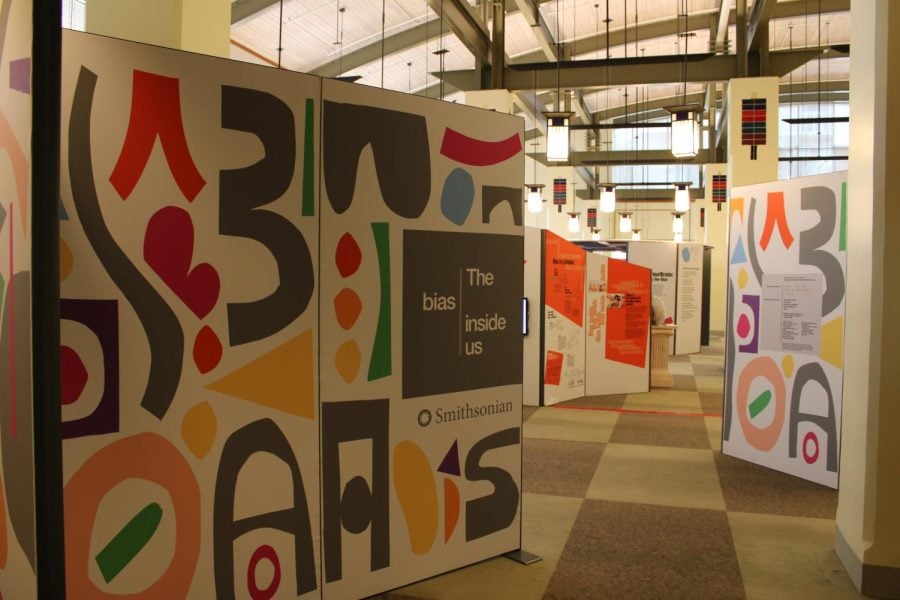Evanston Public Library’s ‘The Bias Inside Us’ encourages self-reflection on human bias
April 11, 2022
Imani Bah, a 2021 Northwestern graduate who now works as a medical scribe in Zion, IL, said she has faced her own internal biases through her work. After attending NU with a majority liberal student body, Bah said working in a conservative area has introduced new challenges.
And according to Bah, her spontaneous weekend visit to Evanston Public Library came at an ideal time. She stumbled upon the library’s display of “The Bias Inside Us,” a free traveling exhibit dedicated to identifying interpersonal bias.
Bah said the showcase struck a chord with her.
“I’ve never seen such a beautiful interactive in such an engaging and educational exhibit,” Bah said. “(The photos of skeletons) shows us that we are all human, and it shows that at our core we are made of the same stuff.”
The showcase, part of a traveling exhibition created by The Smithsonian Institution, was originally planned to be displayed at EPL in fall 2020. It was then moved to April of this year and will remain open to the public through the beginning of May.
Guests at EPL can move chronologically through the exhibit’s six sections — Introduction, The Science of Bias, Bias in Real Life, Serious Consequences–Bias is All Around Us, #RetrainYourBrain and Personal Reflection. The sections use images, videos and artwork to educate visitors on how implicit bias factors human nature and how to combat it.
In the middle of the exhibition lies a “Humanae” project created by Spanish photographer Angélica Dass. The work features various faces of different races and ethnicities on multiple boards with each face matching a Pantone paint shade.
Bah said Dass’ piece forced her to think about her preconceived biases more directly.
“The whole point is about what comes to mind when you look at the picture,” she said. “Do I have some negative ideas or positive ones? Is this someone I think is beautiful?”
The project, based on research by psychologists Mahzarin Banaji and Anthony Greenwald, is intended to show that bias is part of being human. The three goals of the exhibition are to help people understand their implicit biases, increase empathy in communities, and inspire more inclusive spaces, according to the site.
Heather Norborg, EPL’s lifelong learning and literacy manager, said she hopes the exhibit will inspire members of Evanston’s community to consider their unconscious biases.
“I hope that people will talk to each other about these important topics, and when they see examples of bias harming others, that they will speak up about it and not be afraid to name it,” Norborg said.
To present the exhibit, EPL has also partnered with Kids Create Change, an organization that uses art to address sociocultural awareness among young people. Every Saturday at 1 p.m., KCC will host workshops for all ages on the third floor next to the showcase. Participants will create a knit tapestry representing different aspects of human identity with each coil denoting a different story.
Melissa Raman Molitor, one of KCC’s co-directors, said fabric is a “tactile” and “soothing” material that is recognizable for people of all ages. Using recycled materials, such as the yarn they will use in the tapestry, is part of the group’s mission, she said.
Bah said the exhibit showed her that bias starts young. She remembers a speaker in the video adding that, because children don’t know what to make of race, their conceptions of it are completely dependent on external influences.
EPL plans to host several other events in tandem with the showcase. The roster includes “Let’s Talk @ Lunch” — a discussion on racism — and the Human Library, an annual event featuring community members of marginalized identities who can be “checked-out” to talk one-on-one with participants throughout the event. The Human Library aims to highlight diverse life experiences and encourage connections between different people.
For Bah, the exhibit has brought a sense of unity with others.
“I was really happy to see this because it made me feel like… I’m actually normal and we all (have biases),” she said. “It’s all about whether we can recognize it and correct it and make sure we’re not falling into traps.”
Email: [email protected]
Twitter: @swarthout_iris
Related Stories:
— Evanston Public Library presents results of 2021 “listening sessions” about the library’s future
— Evanston Public Library votes to maintain property tax levy for upcoming fiscal year












